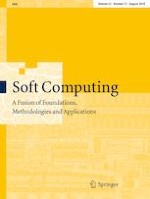18.09.2018 | Foundations
Comparing the magnitude of fuzzy intervals and fuzzy random variables from the standpoint of gradual numbers
Erschienen in: Soft Computing | Ausgabe 15/2019
EinloggenAktivieren Sie unsere intelligente Suche, um passende Fachinhalte oder Patente zu finden.
Wählen Sie Textabschnitte aus um mit Künstlicher Intelligenz passenden Patente zu finden. powered by
Markieren Sie Textabschnitte, um KI-gestützt weitere passende Inhalte zu finden. powered by
